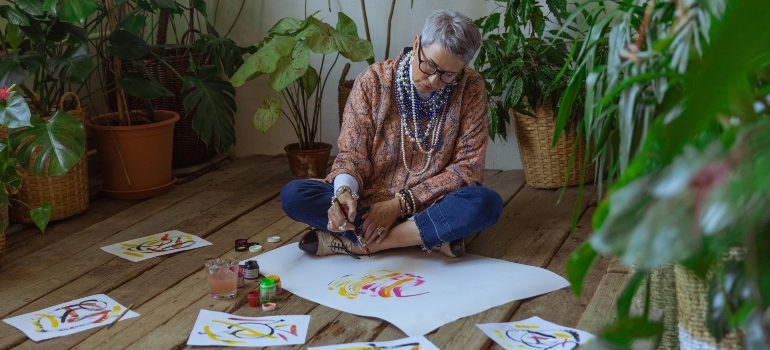As we age, our mental health and well-being become increasingly important aspects of our lives. For many older adults, managing mental health issues like depression, anxiety, or trauma can be challenging, especially when coupled with addiction struggles. That’s why integrating mental health support and addiction treatment for aging adults is of utmost importance. In this blog post, we’ll explore how this integrated approach works and how it can significantly improve the quality of life for aging adults dealing with mental health and addiction issues.
Understanding the Unique Needs of Aging Adults
Aging adults face several challenges that can impact their mental health and increase their vulnerability to addiction. Physical health issues, such as chronic pain or illness, often lead to anxiety or depression. These health problems can also limit mobility and independence, further affecting mental well-being. The loss of loved ones, whether a spouse, family member, or close friend, can cause deep grief and loneliness, which may worsen emotional distress.

Retirement, while sometimes seen as a relief, can also bring a sense of purpose loss and identity, leading to feelings of worthlessness. Social isolation, common among older adults, exacerbates these feelings of sadness and helplessness. Without regular social interactions, they might turn to alcohol or medications for comfort. These factors make older adults more susceptible to mental health problems and substance abuse, highlighting the need for integrated rehab for seniors that addresses both mental health and addiction together.
Recognizing Co-occurring Disorders
Co-occurring disorders refer to the presence of both mental health issues and substance use disorders in the same individual. Among aging adults, these conditions are common. Studies show that about 20% of older adults experience mental health issues, and around 8-10% have substance use problems. Veterans are particularly affected, with around 50% of older veterans having co-occurring disorders. These statistics highlight the need for specialized dual-diagnosis rehab for veterans that would help them overcome these issues.
Recognizing these disorders is crucial for effective mental health support and addiction treatment for aging adults. Comprehensive assessment and diagnosis are essential to identify all underlying issues. This approach ensures that treatment addresses both mental health and addiction, leading to better outcomes. Proper diagnosis helps tailor treatment plans to the individual’s specific needs, improving their overall quality of life.
The Role of Integrated Care
Integrated care combines mental health and addiction treatment services into a single, coordinated approach. This method benefits aging adults by providing comprehensive care that addresses all their needs at once. Here are some key benefits of integrated care:
- Holistic approach: By treating both mental health and addiction issues together, healthcare providers can address the root causes and interconnected aspects of both conditions. This approach ensures that no aspect of a person’s health is overlooked.
- Improved outcomes: Integrated care often leads to better overall health outcomes. When mental health and addiction treatments are coordinated, patients are more likely to adhere to their treatment plans and experience fewer relapses.
- Enhanced communication: When healthcare providers work together, communication improves. This collaboration ensures that everyone involved in a patient’s care is on the same page, reducing the risk of conflicting treatments or missed information.
- Streamlined services: Combining services can simplify the treatment process for patients, making it easier to access the care they need without navigating multiple systems.
- Personalized care: Integrated care allows for more personalized treatment plans that consider all aspects of a patient’s health. This tailored approach can better meet the unique needs of aging adults.

Person-Centered Treatment Approaches
Person-centered treatment approaches are crucial for effectively addressing aging and mental health. These approaches focus on tailoring treatment plans to meet the individual needs and preferences of each aging adult. Considering factors such as medical history, cultural background, and personal goals ensures that the care provided is relevant and effective.
Medical history plays a significant role in shaping a treatment plan. Understanding an individual’s past health issues and current medical conditions helps healthcare providers choose the most appropriate therapies and medications.
Cultural background is another important factor. Different cultures have varying views on mental health support and addiction treatment for aging adults. Respecting these perspectives and incorporating culturally sensitive practices can enhance the effectiveness of the treatment and make the individual more comfortable and engaged.
Personal goals are also vital in person-centered treatment. What one person wants to achieve through therapy might differ from another. Whether it’s improving daily functioning, maintaining independence, or reducing symptoms, aligning the treatment plan with these goals ensures that the care is meaningful and motivating.
Individual therapy for addiction is a key component of person-centered treatment. It allows for one-on-one sessions where specific issues can be addressed in a confidential and personalized manner. This type of therapy provides a safe space for aging adults to express their concerns and work on their goals with the support of a trained professional.
Collaborative Treatment for Mental Health Support and Addiction Treatment for Aging Adults
Collaborative treatment teams bring together professionals from various fields to provide comprehensive care for aging adults with mental health and addiction concerns. These teams typically include psychiatrists, psychologists, addiction counselors, social workers, and primary care physicians. Each member plays a valuable role in addressing different aspects of a patient’s health:
- Psychiatrists specialize in diagnosing and treating mental health disorders. They can prescribe medications and manage their effects, ensuring that any mental health conditions are properly treated.
- Psychologists provide therapy and counseling. They help patients understand and manage their emotions, behaviors, and thought patterns, which is essential for addressing mental health issues.
- Addiction counselors focus on treating substance use disorders. They provide support, education, and strategies to help individuals overcome addiction. They can also suggest the best treatment for each patient, such as outpatient or inpatient drug rehab centers in West Virginia.
- Social workers assist with practical aspects of care. They help patients navigate healthcare systems, access community resources, and manage social and environmental factors affecting their health.
- Primary care physicians oversee the patient’s general health. They monitor physical health conditions, manage medications, and ensure that all aspects of the patient’s health are considered in the treatment plan.

The value of multidisciplinary treatment teams lies in their ability to provide holistic care. They work together to develop and implement a coordinated treatment plan that addresses all of a patient’s needs. This approach ensures that mental health and addiction concerns are treated in conjunction with any other health issues, leading to better overall outcomes.
Evidence-Based Interventions
Evidence-based interventions are crucial for effectively addressing mental health and addiction issues in aging adults. Cognitive Behavioral Therapy (CBT) is one of the most effective treatments for mental health issues such as depression and anxiety. CBT helps individuals identify and change negative thought patterns and behaviors. Studies have shown that CBT can significantly reduce symptoms of depression and anxiety in older adults.
Medication-assisted treatment (MAT) combines medications with counseling and behavioral therapies to treat substance use disorders. Medications such as buprenorphine and methadone are effective in reducing opioid dependence and preventing relapse. MAT has been shown to improve treatment retention and reduce mortality rates among individuals with opioid use disorders.
Motivational Interviewing (MI) is another effective approach used to encourage individuals to move through the stages of change regarding their substance use and mental health behaviors. MI helps patients explore and resolve ambivalence, enhancing their motivation to change.
Statistics from the National Institute of Mental Health (NIMH) show that nearly 20% of adults aged 55 and older experience some type of mental health concern. The Centers for Disease Control and Prevention (CDC) emphasizes the importance of mental health and aging, noting that effective treatment options are available to help older adults manage their mental health and improve their quality of life.
Supportive Services for Older Adults
Supportive services are essential to complement mental health support and addiction treatment for aging adults. These services address various aspects of daily life, enhancing the overall effectiveness of treatment. Here are some key supportive services:
Case Management
Case management services help coordinate various aspects of an individual’s care. They work with healthcare providers, social services, and family members to ensure that all needs are met. They assist with scheduling appointments, managing medications, and accessing resources.
Housing Assistance
Stable housing is crucial for successful mental health and addiction treatment. Options include:
- Sober Living Homes: These provide a structured and supportive environment for individuals recovering from addiction. Sober living WV offers substance-free living space and helps residents transition back into the community.
- Partial Hospitalization Programs (PHPs): Partial hospitalization program West Virginia offers intensive treatment while allowing individuals to live at home or in a sober living facility. They provide a high level of care without the need for full hospitalization.

Transportation Services
Transportation can be a significant barrier to accessing care for older adults. These services help individuals get to medical appointments, therapy sessions, and support group meetings. Reliable transportation ensures that aging adults can consistently attend their treatment sessions and follow-up appointments.
Peer Support Programs
Peer support programs involve individuals who have experienced similar challenges providing support and encouragement. These programs can help reduce feelings of isolation and offer practical advice from those who have successfully navigated similar issues.
Promoting Long-Term Recovery Through Mental Health Support and Addiction Treatment for Aging Adults
Promoting long-term recovery and preventing relapse in aging adults requires a multi-faceted approach. Here are some effective strategies:
- Ongoing monitoring: Regular check-ins with healthcare providers help track progress and address any emerging issues promptly. Monitoring includes routine mental health assessments, medication reviews, and evaluating overall well-being.
- Aftercare planning: Developing a comprehensive aftercare plan is crucial for sustaining recovery. Aftercare plans typically include scheduled therapy sessions, support group meetings, and continued medication management.
- Community-based support: Engaging with community-based support systems can significantly aid in long-term recovery. Community programs, such as senior centers and local support groups, offer a sense of belonging and regular social interaction.
- Lifestyle modifications: Adopting healthy lifestyle habits is essential for maintaining long-term recovery. This includes a healthy diet, regular exercise, and adequate sleep.
How to Maintain Memory and Mental Healthness in Old Age?
In addition to these strategies, focusing on cognitive health is important for aging adults. Activities that stimulate the brain, such as puzzles, reading, and learning new skills, can help maintain memory and cognitive function. Social engagement and maintaining strong relationships are also key factors in promoting mental wellness and preventing cognitive decline.

Empowering Aging Adults and Their Families
Empowering aging adults and their families is essential for navigating the treatment process, advocating for their needs, and finding support throughout the recovery journey. Families can start by educating themselves about age and mental health and understanding the specific challenges their loved ones face. Open communication is key; families should encourage aging adults to express their needs and preferences.
Advocacy is crucial, whether it’s ensuring access to appropriate care, coordinating with healthcare providers, or seeking out specialized services. Family therapy for addiction can be particularly valuable, offering a space to address interpersonal issues, improve communication, and build a supportive environment. Additionally, connecting with community resources, such as support groups and senior centers, can provide both emotional support and practical assistance.
Holistic Approaches to Mental Health and Addiction Recovery for Older Adults
Integrating mental health support and addiction treatment for aging adults is crucial for improving their overall well-being and quality of life. If we address both mental health and substance use disorders through comprehensive and coordinated care, older adults can achieve better outcomes and maintain long-term recovery. If you or a loved one in West Virginia is seeking addiction treatment, consider reaching out to local addiction treatment centers in West Virginia that specialize in providing tailored care for aging adults. These centers offer a range of services designed to support mental health and addiction recovery, ensuring that older adults receive the comprehensive care they need.



